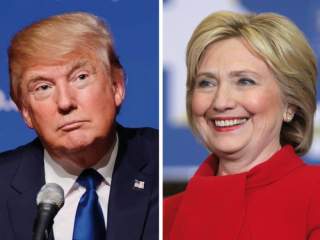U.S. Elites Continue to Ignore Unhappy Public
With Trump and Sanders on the rise against their parties' wishes, continued two-party dominance is in doubt.
The general election is still seven months away. Neither major party has yet selected its standard-bearer for November. It seems the best chance America will have to put a quality man or woman in the White House, however, won’t come this November, but four years from now in 2020. It is embarrassingly clear that the 2016 campaign cycle is proving the political process in the United States for selecting a president is degenerating into a process for selecting whom the American electorate hates the least.
A recent Market Watch analysis found that “it may be the negative enthusiasm factor that drives voter turnout in November, as those who cannot stand the thought of Trump or Clinton in the White House come out to vote against these candidates” noting that the average from more than 100 polls from 18 pollsters showed Trump’s unfavorability rating to be a remarkably high 57%. A Huffington Post analysis, meanwhile, found “the average unfavorable ratings for Clinton in 369 polls from 40 pollsters to be 53.6%.” How can the two candidates have soaring unfavorable ratings, yet also be the current frontrunners for their parties’ nomination? One reason is that the elites from both major parties continue minimizing the role of the general public.
Never have fewer Americans been in control of the election process and never more Americans rendered irrelevant to it. Presently federal campaigns are determined almost exclusively by the ultra-elite. According to OpenSecrets, congressional and presidential elections are dominated by one percent of the top one percent richest Americans. The influence exerted by the remaining 99.9 percent of the country is swallowed up by this “1% of the 1%”. Recent evidence, however, indicates this seemingly impregnable monopoly may be weakening.
Many political pundits and party-affiliated experts are scratching their heads in trying to explain why one by one the Republican Party’s favored presidential candidates melted before the decided non-politician Donald Trump, and why the Democratic Party’s favored candidate Hillary Clinton is losing ground to Bernie Sanders. On the Republican side, it appears the party elite are trying to regain control over who wins their nomination by changing the rules to advantage their preference. It isn’t the first time they’ve used that method.
To the chagrin of many in 2012, the RNC took votes away from states that didn’t select their preferred candidate—Nevada in particular—by changing the standards of Rule 40(b) so that Ron Paul would not be permitted to speak at the Convention and compete for more delegates. This cycle the RNC changed a rule that effectively negates Colorado voters’ choice. Former Colorado state Republican party chairman Ryan Call said the GOP’s actions in Colorado “cut out any semblance of democracy or the popular will in connection with the delegate election event. It became an entire party insiders game.”
An organization called Colorado Votes Matter plans a protest in Denver on April 15. A national group, Democracy Spring, is holding a demonstration in Washington through April 18 protesting the increasing domination of the wealthy super-elite over the US political process. The group claims there is a five million strong and “growing movement in the US demanding solutions to our deeply corrupt political system.”
The fact that millions of Americans are supporting candidates the establishment seems to oppose and thousands are taking to the streets to demonstrate their displeasure shows that it is possible the voting public may be approaching a tipping point in their disgust at being disenfranchised. Unless the major parties wish to continue their pursuit of irrelevancy, they’d better start now in finding and grooming quality candidates for 2020. Some people don’t seem content to wait that long for alternatives.
For the first time since Ross Perot’s effective third-party run in 1992, there is a recent move to draft former Marine general James Mattis as an independent candidate for president. It is likely too late in the cycle for him to mount a serious challenge, but the move is reportedly being backed by a dozen billionaires and, more importantly, by a growing number of regular citizens.
It is a tragedy that a nation so full of power, potential and prestige fields such a stale, feeble stable of candidates for our nation’s highest office. The people, fortunately, are beginning to signal their discontent. Whether the political establishment recognizes this trend and begins to put the desires and interests of the American people above the interests of their party remains to be seen. But one thing is clear: if continued gridlock and ineffective governance in Washington continues after this November, a viable third-party candidate may rise that threatens to sideline the two parties in next cycle. For the sake of the continued strength of our Republic, let us hope so.
Daniel L. Davis is a widely published analyst on national security and foreign policy. He retired as a Lt. Col. after twenty-one years in the U.S. Army, including four combat deployments, and is a member of the Center for Defense Information's Military Advisory Board. The views in these articles are those of the author alone and do not reflect the position of the U.S. Government. Follow him on Twitter @DanielLDavis1.
Image: Donald Trump and Hillary Clinton. Flickr/Gage Skidmore. CC BY-SA 2.0.

